
Ovulation (Fertile Period) & Calendar Method - How is it calculated?
Besides being healthy, what else can help you get pregnant? Sex of course, especially at the right time!
We are talking about the fertile period, basically the days of a woman's menstrual cycle when pregnancy is most likely. Also known as the "fertile window", this depends on the length of the menstrual cycle, which varies from woman to woman.
What does the fertile period mean?
Fertility refers to a person's ability to have children. Your fertile period is those days during your menstrual cycle when your chances of getting pregnant are high, and calculating your monthly fertility window can help you target the best time to have sex if you're trying to get pregnant. However, natural family planning is a less reliable form of contraception and does not protect against sexually transmitted infections.
Let's first understand something about the menstrual cycle. 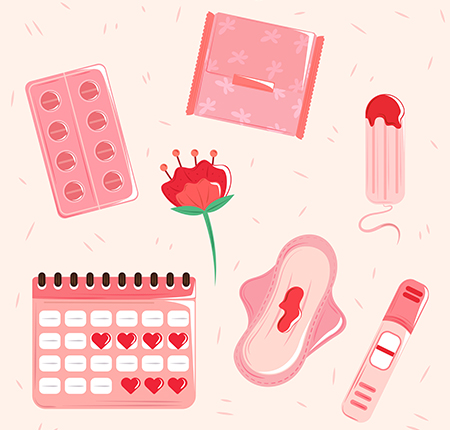
The menstrual cycle is how your body prepares for pregnancy. It starts on the first day of your period, and a typical menstrual cycle is 28 days long, with any cycle lasting between 21 and 35 days being considered normal. The menstrual cycle starts again with the next menstruation.
A lot of changes happen in your body during your cycle, including hormonal fluctuations. Halfway through, one of the ovaries releases a mature egg. The egg travels to one of your fallopian tubes, where it waits to be fertilized by sperm. Also, the lining of the uterus becomes thicker. This prepares the uterus for implantation of the fertilized egg.
If you do not get pregnant, it could mean that the egg did not fertilize or that the embryo (fertilized egg) did not implant in the uterus. In these cases, the lining of the uterus is released and menstruation occurs.
Fertile period - Ovulation symptoms
Some of the symptoms that can occur with ovulation are:
change in basal temperature, it drops slightly, then rises again (the most fertile period is 3 days before the temperature rise);
change in cervical mucus, it becomes clearer, thinner with slippery consistency;
slightly engorged and painful breasts;
abdominal cramps;
increasing libido.
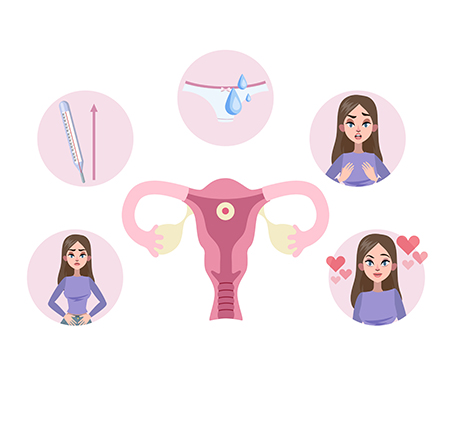
How is the fertile period calculated?
If fertilization does not occur within 24 hours (the lifespan of the ovum) of the egg leaving the ovary, the ovum dissolves. Sperm can live for about 3 to 5 days, so if the period of ovulation is known, partners can calculate their most fertile period.
The most fertile days are considered the three days before ovulation and including the day of ovulation. 12-24 hours after ovulation, a woman can no longer conceive during that menstrual cycle, because the egg is no longer in the fallopian tube.
There are several different methods of calculating your fertile period. We are discovering them together right now.
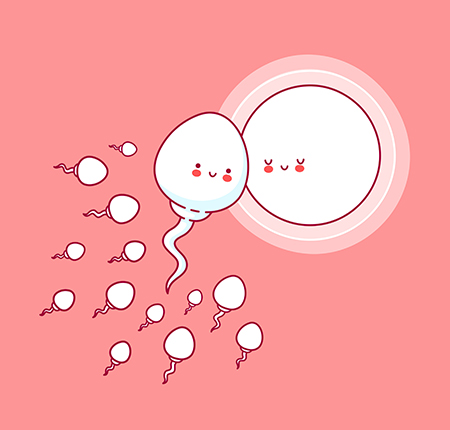
The calendar method
Each month, mark the first day of your period on a calendar or in a period tracking app. The number of days between the first day of consecutive menstruation is the length of the menstrual cycle. You should do this for at least six months to get relevant data.
You ovulate about 12 to 14 days before a new menstrual cycle starts. Your fertile window is the 5 days before ovulation, plus the day of ovulation and the day after ovulation - so about 7 days in total.
It is important to remember that if your period is irregular and the length of your menstrual cycle varies from month to month, the calendar method is not clear and often inaccurate.
This method can be useful if you want to get pregnant, but it is not an effective contraceptive method.
Tip: There are many applications on the Internet that can help you calculate your fertile period based on the calendar method.
Basal temperature method
This method involves taking your temperature every morning as soon as you wake up (before you get out of bed). Use a basal body thermometer (it's more sensitive than a regular thermometer), which can go into the mouth or rectum. It measures body temperature to the tenth of a degree.
A woman's basal body temperature rises slightly during ovulation. If you track your temperatures leading up to ovulation, you should notice a sustained rise in your basal body temperature after ovulation.
It is important to note that the basal body temperature method is not good at predicting your ovulation when you are trying to conceive. It is best to combine it with tracking cervical mucus changes, but also with the calendar method.
Analysis of cervical mucus
Hormonal fluctuations during the menstrual cycle change the amount and consistency of vaginal mucus. You should feel and look at your vaginal mucus every day and record the results on a chart. You're probably ovulating (and most fertile) when the mucus is heavy, wet and slippery, and will have the consistency of raw egg whites.
You should record your vaginal mucus for at least one menstrual cycle. It can be difficult at first to know what to look for, so talk to your gynecologist if you want to try this method.
Ovulation test
Ovulation prediction kits are a useful tool if your periods are regular but you're still not sure if you're seeing natural signs of ovulation (cervical mucus or an increase in basal body temperature). Ovulation prediction kits test your urine for luteinizing hormone levels. When the levels of this hormone are the highest, it means that it is the fertile period.
These kits may not be reliable if you have irregular periods. 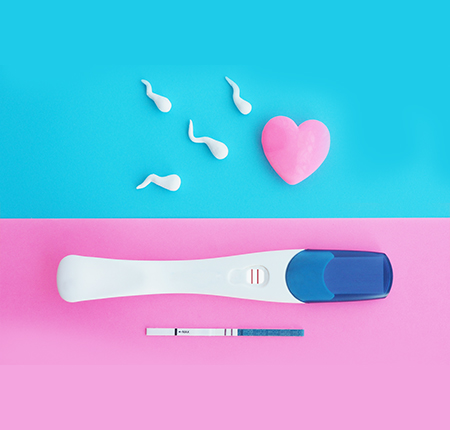
Other methods of identifying monthly fertility
There are also saliva tests that detect the level of estrogen hormones, a level that increases before ovulation. They can be used by women with both regular and irregular periods. In general, such tests are very easy to use.
Other signs that can indicate the period of ovulation are the symptoms we were talking about earlier, such as increased libido, abdominal cramps, spotting or breast pain.
Equally, ovulation can be monitored by means of transvaginal ultrasounds, observing the follicles which, close to maturity, must reach a certain size.
Why is it good to know when you are ovulating?
If you know your ovulation period, it helps you determine the right time to have intercourse that leads to pregnancy. In this way, couples can calculate the day when the chances of getting pregnant are the highest.
Additionally, tracking your menstrual cycle helps you notice hormonal changes and understand your body more easily. If you feel that you want to receive daily protection and care in your most delicate area, choose organic care with 100% natural ingredients. The women behind Enroush understood that the secret to a healthy menstrual cycle lies in absorbents and tampons that do not contain plastic, synthetic fibers, perfumes, and out of love for nature, we created products that take care of you and the planet, without compromise. Timeless mission, natural care.
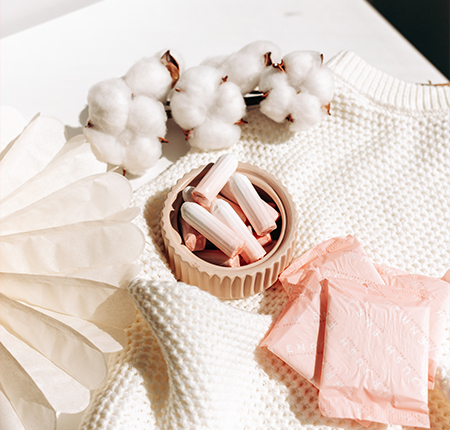
When do you have sex if you want to conceive a child?
For the best chance of pregnancy, you should have sex every day or every other day during:
The five days before ovulation
On the day of ovulation
On the day after ovulation
There is a lot of misinformation out there about sex methods that could increase your chances of getting pregnant. There is no specific sex position that increases your chances of conceiving.
Beware of some lubricants that can negatively affect sperm and prevent them from reaching the egg. To be on the safe side, talk to your gynecologist and ask about lubricants you should avoid.
Why didn't I get pregnant during my fertile period?
Why? Eggs and sperm only live for a short time: sperm live for about five days, eggs can only be fertilized about 24 hours (one day) after they have been released from the ovary. Eggs and sperm must come together at the right time for fertilization to occur to create an embryo.
This means to you that you most likely did not have sex during your fertile period. If, however, after 3-4 menstrual cycles in which you tried to get pregnant, you did not succeed, we recommend that you go to the gynecologist to discover if it is a medical problem.
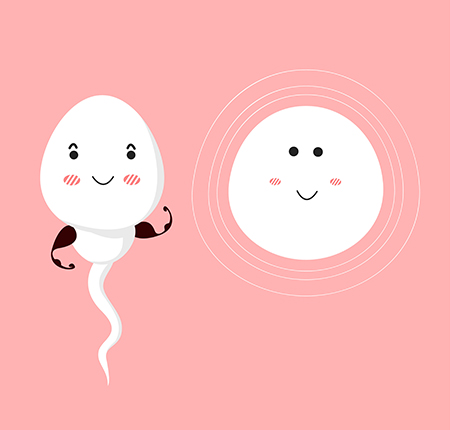
Can I get pregnant if I am not in my fertile period?
Pregnancy is theoretically possible only if you have sex in the five days before ovulation or on the day of ovulation. Ovulation monitoring is not a foolproof method of contraception, however, and we don't recommend relying on it when you don't want to get pregnant.
If you want to read even more about pregnancy and specifically about pregnancy tests, read here about how pregnancy tests work, how safe they are and what happens after a positive result.






















